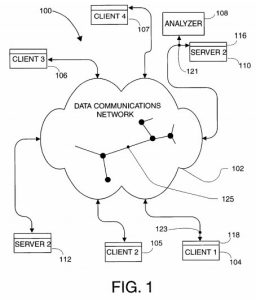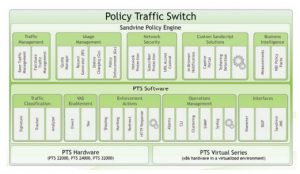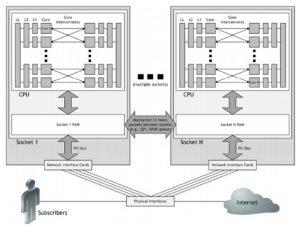 On Thursday, November 9th, a jury verdict entered in a patent infringement case in the Eastern District of Texas held that plaintiff Packet Intelligence, a patent owning entity headquartered in Marshall, TX, did not prove infringement of claims from three patents asserted against Canadian communications service solutions provider Sandvine Corporation (TSE:SVC). The jury verdict comes less than one month after Packet Intelligence won a jury verdict of infringement on the same asserted patents in a different Eastern Texas case filed against Westford, MA-based application and network performance management firm NetScout Systems (NASDAQ:NTCT).
On Thursday, November 9th, a jury verdict entered in a patent infringement case in the Eastern District of Texas held that plaintiff Packet Intelligence, a patent owning entity headquartered in Marshall, TX, did not prove infringement of claims from three patents asserted against Canadian communications service solutions provider Sandvine Corporation (TSE:SVC). The jury verdict comes less than one month after Packet Intelligence won a jury verdict of infringement on the same asserted patents in a different Eastern Texas case filed against Westford, MA-based application and network performance management firm NetScout Systems (NASDAQ:NTCT).
Packet Intelligence first filed its complaint for patent infringement against Sandvine in February of 2016. In that complaint, Packet Intelligence alleged that Sandvine infringed on a series of patents, including:
- U.S. Patent No. 6665725, titled Processing Protocol Specific Information in Packets Specified by a Protocol Description Language. Issued in December 2003, it covers a method of performing protocol specific operations on a packet passing through a connection point on a computer network which addressed a need for mechanisms that perform the real-time elucidation of packets communicated within a data network.
- U.S. Patent No. 6839751, titled Re-Using Information from Data Transactions for Maintaining Statistics in Network Monitoring. Issued in January 2005, it claims a method of analyzing a flow of packets passing through a connection point on a computer network in a way that enables the collection of metrics to analyze the quality and performance of traffic flows.
- U.S. Patent No. 6954789, titled Method and Apparatus for Monitoring Traffic in a Network. It discloses a method of examining packets passing through a connection point on a computer network in a way which creates a signature for packets in a conversational flow associated with an application program to better recognize other packets in that conversational flow.
 Packet Intelligence’s complaint notes that its asserted patents have been cited as pertinent prior art during the prosecution of numerous issued patents and patent applications filed by major tech companies, as much as 260 times in the case of the ‘725 patent. The patents further list Russell Dietz, a recognized thought leader on network data management, as lead inventor.
Packet Intelligence’s complaint notes that its asserted patents have been cited as pertinent prior art during the prosecution of numerous issued patents and patent applications filed by major tech companies, as much as 260 times in the case of the ‘725 patent. The patents further list Russell Dietz, a recognized thought leader on network data management, as lead inventor.
Packet Intelligence’s infringement allegations filed against Sandvine focused on virtual and physical versions of policy traffic switch (PTS) products which serve as “the core of Sandvine’s hardware platform”; Sandvine’s virtual PTS series involves a software-only version of the PTS functionality which are suitable for networks architected for network functions virtualization  (NFV) or software defined network (SDN). Sandvine’s PTS products allegedly include a policy engine (PE) which “can be thought of as a black box into which information about measured conditions and provisioned subscriber entitlement flows, and out of which charging updates, management actions, and business intelligence emerge.” The PTS products provide deep packet inspection (DPI) that reveal real-time information about the identity and measured characteristics of network traffic.
(NFV) or software defined network (SDN). Sandvine’s PTS products allegedly include a policy engine (PE) which “can be thought of as a black box into which information about measured conditions and provisioned subscriber entitlement flows, and out of which charging updates, management actions, and business intelligence emerge.” The PTS products provide deep packet inspection (DPI) that reveal real-time information about the identity and measured characteristics of network traffic.
 Aspects of Sandvine’s PTS products, which allegedly infringed on the patents-in-suit, included the use of various modules to maintaining networking session tables to identify packets with existing sessions, or flows. Packet items such as source IP address, source port number and destination IP address are parsed from arriving packets and examined to improve the quality of network traffic.
Aspects of Sandvine’s PTS products, which allegedly infringed on the patents-in-suit, included the use of various modules to maintaining networking session tables to identify packets with existing sessions, or flows. Packet items such as source IP address, source port number and destination IP address are parsed from arriving packets and examined to improve the quality of network traffic.
The jury verdict entered on November 9th, however, found that Packet Intelligence did not prove by a preponderance of the evidence that Sandvine had infringed the ‘725, the ‘751 or the ‘789 patent. This verdict came out soon after an October 13th jury verdict handed down in Packet Intelligence’s case against NetScout, which found NetScout guilty of infringing those three patents. In that Eastern Texas case, the jury also found that NetScout could not prove invalidity of claims asserted by Packet Intelligence from the three patents-in-suit. In the NetScout case, the jury awarded Packet Intelligence a running royalty of $5.75 million including $3.5 million in damages leading up to the complaint filed in March 2016 and $2.25 for infringement happening after the suit was filed.
The fact that the same three patents would be asserted in the same district court and yet two jury trials reach different conclusions on infringement may seem a bit unusual, although every case is unique. The different outcomes could be simply based on different facts, or could speak to the quality of the legal representation provided by counsel for Sandvine. Whatever the reason, Sandvine’s legal representation provided by Erise IP, called the ruling a “momentous” decision — because of the NetScout infringement findings just weeks earlier. Packet Intelligence had been seeking a total of $14 million in damages, almost three times what the firm earned in running royalties from the NetScout verdict.
Although the asserted patents held by Packet Intelligence were not declared invalid in either Eastern Texas case, Sandvine may yet further benefit from the patent validity trials available through the Patent Trial and Appeal Board (PTAB) enacted by the America Invents Act (AIA) of 2011. According to statistics collected by legal analytics firm Lex Machina, Sandvine has filed a total of seven petitions for inter partes review (IPR) proceedings at the PTAB to challenge various Packet Intelligence patents. Although six of the petitions were denied institution, one IPR proceeding which challenges the ‘725 patent was instituted by a panel of administrative patent judges (APJs) at the PTAB, indicating that Sandvine has shown a reasonable likelihood that the ‘725 patent is directed at unpatentable subject matter.
Sandvine’s petition for IPR proceedings to challenge the ‘725 patent was instituted on August 31st of this year. In that petition, Sandvine alleged that claims 1 and 2 of the ‘725 patent were invalid on 35 U.S.C. § 102(b) grounds as being anticipated by a patent application published by the World Intellectual Property Organization (WIPO) in June 1997. That patent application, titled System and Method for General Purpose Network Analysis (“Baker”), covered a network interface system and related methods for providing a configurable protocol analysis capability with common control logic applicable to many different network devices. In the institution decision, the PTAB panel agreed with Sandvine’s arguments that the data structure being configured for “rapid” searches is not entitled to patentable weight and that if the “rapid” term limits the challenged claim, then a person of ordinary skill in the art would have understood that Baker discloses the same function.
Generally speaking instituted IPR proceedings are decided 12 months after institution, and only in rare instances has the USPTO extended that statutory deadline, which it can do for up to 6 months.

![[IPWatchdog Logo]](https://ipwatchdog.com/wp-content/themes/IPWatchdog%20-%202023/assets/images/temp/logo-small@2x.png)

![[Advertisement]](https://ipwatchdog.com/wp-content/uploads/2024/04/Patent-Litigation-Masters-2024-sidebar-early-bird-ends-Apr-21-last-chance-700x500-1.jpg)

![[Advertisement]](https://ipwatchdog.com/wp-content/uploads/2021/12/WEBINAR-336-x-280-px.png)
![[Advertisement]](https://ipwatchdog.com/wp-content/uploads/2021/12/2021-Patent-Practice-on-Demand-recorded-Feb-2021-336-x-280.jpg)
![[Advertisement]](https://ipwatchdog.com/wp-content/uploads/2021/12/Ad-4-The-Invent-Patent-System™.png)







Join the Discussion
No comments yet.